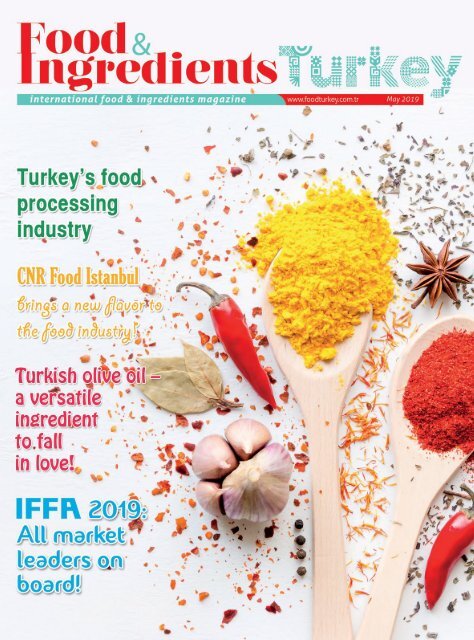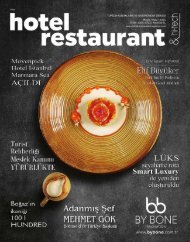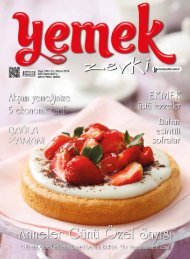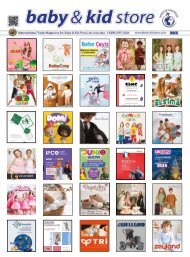Food Turkey Magazine May 2019
Food Turkey Magazine May 2019
Food Turkey Magazine May 2019
You also want an ePaper? Increase the reach of your titles
YUMPU automatically turns print PDFs into web optimized ePapers that Google loves.
Our success is<br />
showing!<br />
I have some very good news for you regarding this magazine. At<br />
a time many when many publishers cease their publications, we<br />
converted this magazine to be a monthly publication from being<br />
a bimonthly since it was first published in 2014.<br />
My other news is on the title, a radical change that you must<br />
have noticed. We converted the title from “<strong>Food</strong> <strong>Turkey</strong>” to<br />
“<strong>Food</strong> & Ingredients <strong>Turkey</strong>”. We will cover food and beverage<br />
ingredients in addition to packaging and processing facilities and<br />
technologies to cover all supply chain of the industry.<br />
By adding the “ingredients” segment in our content led us to<br />
go to all leading ingredients shows around the world. We are<br />
starting with IFFA to be held in Frankfurt, 4-9 <strong>May</strong> <strong>2019</strong>. We will<br />
continue with FI shows to be held in India and France along with<br />
other related shows.<br />
As you may also noticed we are now more international with<br />
many foreign advertising customers who are using this medium<br />
in their media plan to promote their products and services. We<br />
are determined to improve this wing very fast and to be more<br />
international.<br />
Group Chairman<br />
Publisher<br />
Managing Editor<br />
(Responsible)<br />
Foreign Relations<br />
Manager<br />
Editor<br />
Advertisement Manager<br />
Art Director<br />
Finance Manager<br />
Accounting Manager<br />
Subscription<br />
H.Ferruh ISIK<br />
ISTMAG Magazin Gazetecilik<br />
Yayıncılık İç ve Dış Ticaret Ltd. Şti.<br />
Mehmet SOZTUTAN<br />
(mehmet.soztutan@img.com.tr)<br />
Ayça SARIOGLU<br />
(ayca.sarioglu@img.com.tr)<br />
Aslı OZEL<br />
(asli.ozel@img.com.tr)<br />
Emir Omer OCAL<br />
(emir.ocal@img.com.tr)<br />
Omer Faruk GORUN<br />
(fgorun@ihlas.net.tr)<br />
Tolga CAKMAKLI<br />
(tolga.cakmakli@img.com.tr)<br />
Mustafa AKTAS<br />
(mustafa.aktas@img.com.tr)<br />
Zekayi TURASAN<br />
(zturasan@img.com.tr)<br />
İsmail OZCELIK<br />
(ismail.ozcelik@img.com.tr)<br />
Last but not least we will be at all leading fairs of the main food<br />
and beverage industry such as Fancy <strong>Food</strong> NY, Anuga, Sial, Gulfood,<br />
Gulfood Manufacturing, CNR <strong>Food</strong> Istanbul, World <strong>Food</strong>,<br />
etc.<br />
I will continue to give you always better news. Stay with us and<br />
take care!<br />
HEAD OFFICE<br />
Güneşli Evren Mah. Bahar Cad.<br />
Polat İş Merkezi B Blok No:3,34197<br />
Güneşli-İstanbul/TURKEY<br />
Tel: +90 212 604 50 50<br />
Fax: +90 212 604 50 51<br />
LIAISON OFFICE:<br />
Buttim Plaza A. Blok<br />
Kat:4 No:1038<br />
Bursa/TURKEY<br />
Tel: +90. 224 211 44 50-51<br />
Fax: +90. 224 211 44 81<br />
Mehmet Söztutan<br />
4 <strong>Food</strong> & Ingredients TURKEY <strong>May</strong> <strong>2019</strong><br />
PRINTED BY<br />
IHLAS GAZETECILIK A.Ş.<br />
Merkez Mahallesi 29 Ekim Caddesi İhlas Plaza No:11 A/41<br />
Yenibosna-Bahçelievler/ISTANBUL<br />
Tel: 0212 454 30 00
Meet the meat<br />
industry!<br />
I am on my way to Frankfurt for IFFA, which is the place where<br />
the professionals of the meat industry come together to shape<br />
the future and to develop innovation, connect with business<br />
leaders and find effective solutions.<br />
IFFA is celebrating its 70th birthday in <strong>2019</strong>. It was held for the<br />
first time in 1949, within the framework of the conference of<br />
the German Butchers’ Association at Frankfurt Fair and Exhibition<br />
Centre. Over the decades, it has become the must-attend<br />
show for the global meat industry. Its continuous success lies in<br />
this impressive history and its strong roots in the butchers’ trade<br />
and industry.<br />
It’s to my surprise that there are only 10 Turkish exhibitors in<br />
this most important show of the industry. In fact, <strong>Turkey</strong> has a<br />
strong meat industry depending on its way of culture, nutrition<br />
style, tradition and religion. The oriental carnivorousness of the<br />
nation, I’m sure, will lead the industry more to this show and we<br />
will witness hundreds of exhibitors in the coming years.<br />
Ayça Sarıoğlu<br />
ayca.sarioglu@img.com.tr<br />
IFFA has always been a place for international exchange of ideas,<br />
new developments and relations. It’s the place you can see what<br />
your customers might want soon from the market and shape<br />
yourself accordingly. It is the correct place to see what others<br />
have developed to offer to your customers. It is the best place<br />
for you to get new ideas and new customers. IFFA is the place<br />
you’re inspired and motivated for new developments. You should<br />
see for yourself, you should visit for yourself, you should exhibit<br />
for yourself and for others.<br />
6 <strong>Food</strong> & Ingredients TURKEY <strong>May</strong> <strong>2019</strong>
CONTENTS<br />
8<br />
New Pavilions announced<br />
at the Nigerian<br />
<strong>Food</strong> Event <strong>2019</strong><br />
10<br />
“Since 1970 the Italian<br />
Quality for the<br />
True Accuracy” Automatic<br />
Powder Ingredients<br />
Weighing<br />
Systems<br />
14<br />
Estuz produced the<br />
first collagen drink of<br />
<strong>Turkey</strong> with protein<br />
16 38<br />
CNR <strong>Food</strong> Istanbul<br />
brings a new flavor to<br />
the food industry!<br />
20<br />
Flavor trends forecast<br />
<strong>2019</strong>/2020 by ITS<br />
26<br />
Essential oils: Turkish<br />
Rose Oil<br />
32<br />
<strong>Turkey</strong>’s poultry<br />
production on rise<br />
<strong>Turkey</strong>’s open<br />
windows in poultry,<br />
Has Tavuk<br />
42<br />
IFFA <strong>2019</strong>: All market<br />
leaders on board!<br />
46<br />
<strong>Turkey</strong>’s food processing<br />
industry<br />
54<br />
Vitafoods Europe<br />
<strong>2019</strong>: guiding the<br />
industry to a more<br />
sustainable future<br />
58<br />
Turkish olive oil – a<br />
versatile ingredient to<br />
fall in love!<br />
64<br />
Chr. Hansen launches<br />
Hansen sweet potato<br />
– the secret<br />
behind the market’s<br />
best carmine alternative!<br />
66<br />
FI Global brings them all<br />
70<br />
Russia to double<br />
tomato imports from<br />
<strong>Turkey</strong><br />
8 <strong>Food</strong> & Ingredients TURKEY <strong>May</strong> <strong>2019</strong>
New Pavilions announced at<br />
the Nigerian <strong>Food</strong> Event <strong>2019</strong><br />
The organiser has been generating attractive structural<br />
developments on country pavilions countries including<br />
China, Korea, Norway and <strong>Turkey</strong>.<br />
The recently launched Nigerian <strong>Food</strong><br />
Event <strong>2019</strong> has been gaining traction<br />
amongst manufacturers, suppliers and<br />
major buyers from across the food,<br />
beverage and hospitality sectors both<br />
in Nigeria and internationally. Consequently,<br />
organisers have introduced<br />
dedicated Pavilions to group together<br />
relevant products and regions.<br />
Some of the key pavilions announced<br />
will be ‘country’ pavilions where we’ll<br />
see groups of top suppliers and manufacturers<br />
from those regions exhibiting<br />
to give an otherwise diverse selection<br />
of products a more coherent offering<br />
of that region’s primary exports. The<br />
current country pavilions include China,<br />
Korea, Norway and <strong>Turkey</strong>.<br />
The Nigerian Enterprise Zone will be<br />
another pavilion present at this year’s<br />
exhibition. Specifically designed for<br />
SMEs, this will provide a great opportunity<br />
for companies looking to expand<br />
or enhance their existing reach<br />
in the West African region from the<br />
local market.<br />
The Regional Director for Afrocet<br />
Montgomery announced the new<br />
development recently about the introduction<br />
of these pavilions: “With<br />
a brand new exhibition, we’re always<br />
looking for ways to bring together<br />
an exciting while structured offering,<br />
and we believe that introducing these<br />
pavilions will help, provide a better<br />
framework for SME brands as well as<br />
international brands interested in the<br />
West African market.”<br />
Drink Lagos!<br />
This year’s exhibition will also include<br />
dynamic features such as ‘Drink Lagos’<br />
as part of the co-located Nigerian<br />
Drink Event, a premier pavilion<br />
for those who source, buy or serve<br />
drinks from sommeliers to bartenders<br />
and the ‘Chef Skillery’ which will<br />
invite leading chefs into a live kitchen<br />
demonstration area to provide exclusive<br />
tips and tricks from trending<br />
ingredient combinations to technique.<br />
Hostex West Africa<br />
NFE <strong>2019</strong> also includes a dedicated<br />
co-located show; the Nigerian Hospitality<br />
Event which will serve Hostex<br />
West Africa; this well-known brand<br />
will host leading hospitality suppliers<br />
and service-providers from across the<br />
region.<br />
The inaugural edition of the Nigerian<br />
<strong>Food</strong> Event will be taking place from<br />
the 22 – 24 of October at the Landmark<br />
Centre in Lagos, Nigeria. Brought<br />
to you by the leading exhibition and<br />
event organisers in West Africa, Afrocet<br />
Montgomery, this new event will<br />
provide a pivotal trade platform for<br />
those working in the retail, food service,<br />
wholesalers and hospitality markets.<br />
With the numerous show-floor<br />
events and demonstrations taking<br />
place, Afrocet Montgomery hopes to<br />
attract over 2,000 visitors with 150<br />
brands represented from across the<br />
food, beverage and hospitality industries.<br />
For those interested in enquiring<br />
about any of the new pavilions at the<br />
Nigerian <strong>Food</strong> Event, can get in touch<br />
directly with Tom Meek, the International<br />
Sales Manager for the exhibition<br />
at Tom.Meek@montex.co.uk or via telephone<br />
on +44 (0)20 7886 3028.<br />
10 <strong>Food</strong> & Ingredients TURKEY <strong>May</strong> <strong>2019</strong>
3<br />
DAYS<br />
85<br />
EXHIBITORS<br />
THE PREMIER<br />
INTERNATIONAL<br />
EXHIBITION FOR THE<br />
FOOD<br />
BEVERAGE AND<br />
HOSPITALITY<br />
SECTOR IN NIGERIA<br />
Book<br />
your<br />
stand<br />
today!<br />
2500<br />
VISITORS<br />
Co-located with:<br />
Get in touch to book now:<br />
Tom Meek<br />
International Sales Manager<br />
Tom.Meek@montex.co.uk<br />
+44 (0)20 7886 3028<br />
www.nigerianfoodevent.com<br />
Brought to you by:
“Since 1970 the<br />
Italian Quality<br />
for the True<br />
Accuracy”<br />
Automatic<br />
Powder<br />
Ingredients<br />
Weighing Systems<br />
Lawer provides products, solutions and<br />
services to the industry to increase<br />
the reliability, safety and efficiency of<br />
dosing and dispensing operations for<br />
powders and liquids. Our core market<br />
position, that of a leading global product<br />
and solution provider together<br />
with our aim to set strong standards<br />
in all areas of our business, are both<br />
reflected in our company motto: “the<br />
true accuracy”. We have almost 50<br />
years’ experience in supporting the<br />
industry to ensure the highest quality<br />
of the products. Our ability to do this<br />
is based on the “Italian Quality” of<br />
our products and services combined<br />
with our continuous investment in<br />
developing leading technology. As a<br />
result, more than 2500 customers put<br />
their trust in our company having allowed<br />
us to supply them with thousands<br />
of systems and solutions during<br />
our long history. Via our world-wide<br />
presence, we stand beside our customers<br />
around the globe and through<br />
the whole life cycle of our products,<br />
from the assistance with selecting the<br />
right equipment, design-in support, installation<br />
and after sale service. Lawer<br />
is a global automatic dosing and dispensing<br />
systems manufacturer based<br />
in BIELLA area, providing products for<br />
various industries as Textile – Cosmetics<br />
– Painting/Coating – <strong>Food</strong> – Plastic<br />
– Rubber.<br />
Quality and Excellence expressed<br />
since the preliminary analysis to the<br />
commissioning of the equipment, to<br />
ensure safe and automated systems<br />
operated by high-class software, able<br />
to adapt themselves to the changing<br />
needs of manufacturing companies.<br />
The true Accuracy it is in every small<br />
detail that is measured the great value<br />
of a Company. Lawer has made a<br />
hallmark of accuracy. In research, in<br />
the production cycle, in the technical<br />
support, every minimum detail is evaluated<br />
by the stricter controls.<br />
Service via our world-wide presence,<br />
we stand beside our customers<br />
around the globe from assistance for<br />
selecting the right equipment up to<br />
the best after sale support.<br />
12 <strong>Food</strong> & Ingredients TURKEY <strong>May</strong> <strong>2019</strong>
Innovation We strongly invest in developing<br />
leading technology and new<br />
products. We encourage and facilitate<br />
a company culture of systematic<br />
and sustainable creativity<br />
and innovation.<br />
product portfolio<br />
/ Automatic Powder Dosing<br />
Systems with:<br />
single scale technology<br />
double scale technology<br />
multi scale technology<br />
Engineering Support<br />
/ consultancy assistance for the optimal<br />
selection of the right system and<br />
the most innovative technical solutions<br />
/ desing.in support for integrating our<br />
products and solutions into your production<br />
line<br />
/ customisation to suit your individual<br />
needs.<br />
After sale service and<br />
assistance<br />
/ Flexibility, professionalism, capillarity<br />
of the international network with 45<br />
highly qualified Agents.<br />
/ Ability to analyse, identify, translate<br />
the client’s needs in a personalized<br />
project. Short time in the projecting,<br />
manufacture and installation of the<br />
systems. A timeliness after-sales service,<br />
able to respond to every request<br />
and problem-solving, with qualified<br />
technicians, 4 Service Centres, a Web<br />
on-line remote assistance. Support<br />
services program designed to optimize<br />
the interventions and reduce<br />
costs.<br />
CONCEPT : Automatic<br />
Powder Ingredients Weighing<br />
Systems<br />
The different models of UNICA have<br />
been designed and patented to organize<br />
production in an innovative way<br />
by automatically weighing the powder<br />
ingredient components of recipes and<br />
batches in different processes of the<br />
food preparation industry. The ingredients<br />
are stored in stainless steel silos<br />
and the products are dosed using<br />
stainless steel screws. The ingredients<br />
are dosed into buckets, either manually<br />
or automatically placed on the<br />
weighing trolley which has an electronic<br />
scale. The weighing trolley automatically<br />
positions the bucket under<br />
the silo from which the ingredients are<br />
to be dosed. The management software<br />
allows collects all information<br />
about the operation reports and statistics.<br />
The pc can be interfaced with<br />
external systems to export the data.<br />
<strong>May</strong> <strong>2019</strong> <strong>Food</strong> & Ingredients TURKEY 13
ADVANTAGES and BENEFITS<br />
1.ACCURACY<br />
2.REPEATABILITY<br />
3.TRACEABILITY<br />
4.SECURITY<br />
5.EFFICENCY<br />
6.SAVING<br />
7.KNOW-HOW PROTECTION<br />
for application in small-medium size<br />
laboratory we offer differents models<br />
of UNICA systems<br />
UNICA TWIN<br />
/100 L. capacity silos<br />
/single or double scale<br />
/12-24 or 36 silos configuration<br />
/scale 30 kg capacity, 0.1 gr resolution<br />
/loading operation by gravity from a<br />
rear platform<br />
/manual or automatic bucket loading/<br />
unloading<br />
UNICA HD<br />
/50 L capacity silos<br />
/single scale<br />
/8-16 or 24 silos configuration<br />
/scale 30 kg capacity, 1 gr resolution<br />
/loading operation by gravity from a<br />
front platform<br />
/manual or automatic bucket loading/<br />
unloading<br />
UNICA MD - SD<br />
/18-36 L capacity silos on MD, 12-24 L<br />
capacity silos on SD<br />
/single scale<br />
14 <strong>Food</strong> & Ingredients TURKEY <strong>May</strong> <strong>2019</strong><br />
/max 13 small silos positions<br />
/scale 30 kg capacity, 1 gr resolution<br />
/loading operation by gravity from the<br />
front side<br />
/manual or automatic bucket loading/<br />
unloading<br />
For application in industrial production<br />
Lawer provide systems with high<br />
productivity and efficiency.<br />
SUPERUNICA<br />
Superunica is a fully automatic weighing<br />
system, allowing accurate safe and<br />
clean powder recipes preparation.<br />
The system consists of a number of<br />
independent storage silos, installed in<br />
line on a modular structure. A weighing<br />
trolley incorporating the electronic<br />
scale is automatically transported to<br />
the correct silo position. Each module<br />
can accommodate silos with different<br />
capacities (300, 150 , 100 and 50<br />
L) which are loaded by gravity or by<br />
means of a vacuum system. The bucket<br />
loading / unloading process takes<br />
place automatically and each bucket<br />
is identified by an ID-TAG system. An<br />
efficient suction / filtering device guarantees<br />
the maximum safety of operation<br />
and a clean working environment.<br />
The system operates by means of<br />
dedicated Lawer Software<br />
SUPERSINCRO<br />
Supersincro allows precise and safe<br />
automatic dosing operations of the<br />
ingredients required for the food<br />
industry preparations in automatic<br />
thermoformed bags consisting of tubular<br />
films. The modular configuration<br />
is based on the number of products<br />
used, and the physical characteristics<br />
and the packaging used. At each cycle<br />
the package container is placed on a<br />
moving tray and transported on a U<br />
route placing the package under the<br />
different dosing units. When the container<br />
is in the correct position for the<br />
product, the scale lifts up the container<br />
and starts the dosing procedure.<br />
At the end of the loop the bags are<br />
closed and placed automatically in<br />
boxes or pallets.
...Since 1970 the<br />
Italian Quality for<br />
the true Accuracy...<br />
AUTOMATIC POWDER<br />
DOSING SYSTEMS:<br />
/ Single scale technology<br />
/ Double scale technology<br />
/ Multi scale technology<br />
REPEATABILITY<br />
TRACEABILITY<br />
ACCURACY<br />
lawer.com
Estuz produced the<br />
first collagen drink<br />
of <strong>Turkey</strong> with<br />
protein<br />
Estuz A.S., the taste<br />
of our meals in<br />
our kitchen since<br />
1982, entered the<br />
beverage industry.<br />
Exporting salt to<br />
15 countries, Estuz<br />
A.S. manufactured<br />
the first collagen<br />
drink with protein<br />
of <strong>Turkey</strong>.<br />
After the R&D studies over 2 years,<br />
Reneva was launched and took its<br />
place on shelves of pharmacies, markets<br />
and online shopping with the<br />
motto of #kendiniyenile (#refreshyourelf).<br />
Demanded by 3 countries<br />
Reneva Collagen Protein Drink Beauty<br />
and Reneve Collagen Protein Drink<br />
Fit with two commercial forms of<br />
the name, the product began to be<br />
known worldwide before its launch in<br />
<strong>Turkey</strong>. The product has already welcomed<br />
demands from the US, Israel<br />
and TRNC.<br />
It is beneficial for hair, skin,<br />
nail and muscle health<br />
Reneva consists of the components<br />
used to regulate skin, hair, nail health<br />
and muscle development. Reneva’s<br />
collagen increases collagen production,<br />
which begins to decrease after<br />
the age of 25 in the body. It was observed<br />
in clinical studies that collagen<br />
significantly increases skin, hair and nail<br />
health and regulates muscle development.<br />
16 <strong>Food</strong> & Ingredients TURKEY <strong>May</strong> <strong>2019</strong>
CNR <strong>Food</strong> Istanbul<br />
brings a new flavor<br />
to the food industry!<br />
Leading firms of the food, packaging, out-of-home consumption<br />
and suppliers industry will exhibit its newest products on 4-7<br />
September at CNR <strong>Food</strong> Istanbul that is organized with the aim<br />
of being the biggest food fair in the world.<br />
Hard preparations are made for CNR<br />
<strong>Food</strong> Istanbul, which will be held on<br />
4-7 September <strong>2019</strong> at CNR Expo<br />
Yeşilköy in order to increase the commercial<br />
capacity of the Turkish food industry<br />
and compose a unity of power<br />
in the sector.<br />
CNR <strong>Food</strong> Istanbul, which set a foreign<br />
buyer record in September every<br />
year, has already started its preparations<br />
for the organization of September<br />
<strong>2019</strong>. Thousands of brands will<br />
exhibit the newest products in the<br />
fair that will take place on an area of<br />
80,000square meters.<br />
18 <strong>Food</strong> & Ingredients TURKEY <strong>May</strong> <strong>2019</strong>
“CNR <strong>Food</strong> Istanbul will be<br />
one of the world’s leading fairs<br />
according to domestic and<br />
national production spirit”<br />
Sharing the details of CNR <strong>Food</strong> Istanbul,<br />
<strong>Food</strong> and Beverage Products,<br />
<strong>Food</strong> Processing Technologies Fair,<br />
which will be held in CNR Expo<br />
Yeşilköy by CNR Fair with the support<br />
of TGDF this year between 4-7<br />
September <strong>2019</strong>, İlknur Menlik, TGDF<br />
Secretary General, underlined that<br />
they, as TGDF, set out to organize <strong>Turkey</strong>’s<br />
largest food fair with CNR Fair<br />
Organization.<br />
Leading brands of the food<br />
industry at CNR <strong>Food</strong><br />
Istanbul<br />
Supported by the Ministry of Economy<br />
and offering unique commercial<br />
opportunities to participants, CNR<br />
<strong>Food</strong> Istanbul will bring together the<br />
giants of the food sector on 4-7 September<br />
<strong>2019</strong> in CNR EXPO Yeşilköy,<br />
center of export.<br />
CNR <strong>Food</strong> Istanbul that brings together<br />
beverage, out-of-home consumption<br />
products and suppliers, packaging<br />
industry in the only platform under<br />
the same roof waits for participant.<br />
20 <strong>Food</strong> & Ingredients TURKEY <strong>May</strong> <strong>2019</strong>
Flavor trends forecast<br />
<strong>2019</strong>/2020 by ITS<br />
As a BRC AA grade ingredient manufacturing company<br />
and the most innovative, passionate and agile developer<br />
of natural taste and texture solutions, ITS (International<br />
Taste Solutions) makes healthier foods taste better. They<br />
inspire and empower the customers to successfully develop<br />
market-winning products through anticipating future<br />
needs, developing innovative, high quality solutions and<br />
delivering an exceptional customer experience.<br />
As part of the drive to pinpoint flavor<br />
trends for the future, ITS carries<br />
out intensive market research. This<br />
enables the ITS marketing and innovation<br />
teams to advise customers on<br />
emerging flavors and help them develop<br />
new recipes to capitalize on<br />
market opportunities. Following is<br />
what ITS marketing and innovation<br />
teams have to offer for the future:<br />
The main flavor trends on the radar<br />
that will emerge during <strong>2019</strong>/20 are<br />
Very Berry<br />
Berry flavors are on trend, there’s no<br />
doubt of it. Why? Well, berries are<br />
highly nutritional and healthy, they<br />
work well in endless applications and<br />
are attractive to the eye, which makes<br />
them instagramable and shareable on<br />
any digital platform! We are talking<br />
about strawberries, raspberries or<br />
blueberries, but also new, more exotic<br />
varieties like acai berries or goji<br />
berries!<br />
Tropical Temptation<br />
Consumers dream of being on vacation<br />
all year round and what flavors<br />
could be better to bring us on holidays<br />
than tropical flavors? They are<br />
ideal, especially in the summer season,<br />
when we will see passion fruit, mango,<br />
guava, jackfruit and papaya in drinks,<br />
bakery, snacks and sports nutrition<br />
applications.<br />
Green Is Go<br />
The healthy trend is here to stay and<br />
its color is, definitely green. Green veggies,<br />
green fruit and anything naturally<br />
green fits in here, even herbs and<br />
spices! Their natural appeal will make<br />
the product a success, whether it is a<br />
shake, a cereal bar or a yogurt. Cu-<br />
22 <strong>Food</strong> & Ingredients TURKEY <strong>May</strong> <strong>2019</strong>
cumber, kiwi, spinach, avocado… but<br />
also green tea, or basil are welcome!<br />
Room for Mushroom<br />
Following with the natural and healthy<br />
market move, earthy flavors are on<br />
the rise too. Mushroom flavors make<br />
us recall the pleasure of sniffing the<br />
earthy air that rises up after it rains.<br />
Shiitake, truffle or porcini flavors will<br />
be increasingly seen in delicatessen<br />
breads and buns, savory biscuits or<br />
crisps.<br />
Citrus is Back<br />
Lemon, and especially lime are on<br />
trend. And so are tangerine, orange<br />
and mandarin. We are seeing citrus in<br />
many different applications, which will<br />
increase even more during <strong>2019</strong>-20.<br />
Yogurt, milk shakes, bars, sports nutrition<br />
gels and powders, and even<br />
crisps will include citrus flavors!<br />
Travel the World<br />
Consumers want to travel the<br />
world through food. The amount of<br />
restaurants offering world cuisines<br />
is increasing everywhere and supermarkets<br />
are listing more and more<br />
options on world food. During the<br />
next two years, Italian spices and flavors<br />
will continue to grow, alongside<br />
Indian flavors and curries and Chinese<br />
meals and spices.<br />
24 <strong>Food</strong> & Ingredients TURKEY <strong>May</strong> <strong>2019</strong>
Mediterranean Flavors<br />
Mediterranean flavors from Italy or<br />
Spain like rosemary, basil or garlic<br />
have been in the market for a<br />
long time now. The next two years,<br />
though, will see a different range<br />
of Mediterranean flavorings being<br />
launched. This time, it will be flavorings<br />
from the Eastern Mediterranean.<br />
We will see pistachio, olive<br />
oil, watermelon, date or mint will be<br />
used in bread, biscuits, drinks, cereals<br />
and dairy.<br />
Warming Spices<br />
The aim to renew product ranges<br />
and to surprise the audience brings<br />
brands to launch seasonal products,<br />
which are very welcome by consumers.<br />
The winter season is ideal for<br />
warming spices like pumpkin spice,<br />
orange spice, gingerbread or apple<br />
spice. We will see them in hot drinks,<br />
cereal bars, biscuits, dairy and sports<br />
nutrition amongst others.<br />
Sensory Explosion<br />
Consumers are looking for new, exciting<br />
experiences, even when they<br />
eat. Following with this trend, we will<br />
see more products aiming for a temperature<br />
or texture shock. Hot spices<br />
combined with sour flavors, popping<br />
candy or extreme combinations<br />
will be seen within this category.<br />
SOURCE: https://www.itstaste.com/news/its-flavour-trends-forecast-<strong>2019</strong>-2020.<br />
26 <strong>Food</strong> & Ingredients TURKEY <strong>May</strong> <strong>2019</strong>
Essential oils:<br />
Turkish Rose Oil<br />
Essential oils are aromatics or odorous,<br />
oily liquids (sometimes semi-liquid or<br />
solid) obtained from parts of plants,<br />
such as flowers, buds, seeds, leaves,<br />
twigs, bark, herbs, woods, fruits and<br />
roots. Essential oils are mainly used in<br />
the food industry as flavoring agents,<br />
in the perfume industry for fragrances<br />
and in the pharmaceutical industry for<br />
adding taste or smell or suppressing<br />
the less desirable medicine taste.<br />
Owing to <strong>Turkey</strong>’s suitable climatic<br />
and ecological conditions, hundreds of<br />
medical and aromatic plants are cultivated<br />
or gathered from the nature.<br />
<strong>Turkey</strong> is one of the countries best<br />
suited for organic cultivation.<br />
In <strong>Turkey</strong>, there are many plants from<br />
which essential oils are produced and<br />
rose is the most popular one.<br />
What is rose oil?<br />
Rose oil is steam distilled from the<br />
flowers of the Rose damascena. Rose<br />
oil, its extracts and derives are among<br />
the most important ingredients of<br />
natural perfume. They have remarkable<br />
diffusive power and are used in<br />
many types of perfume bases, particularly<br />
blending well with other florals.<br />
Rose oil is a very expensive essential<br />
oil, partly due to the lack of quality<br />
natural and synthetic substitutes. The<br />
short flowering time of the Rose<br />
damascena is another reason for its<br />
high price.<br />
History of the Turkish Rose<br />
damascena<br />
Rose damascena was brought to Anatolia<br />
in 1870 by immigrants from Bulgaria.<br />
In 1888 cultivation of the rose<br />
began in Isparta and in 1892 the production<br />
of rose oil was accomplished<br />
by a person named “Müftüzade İsmail<br />
Efendi”. For years, rose oil was produced<br />
in simple and primitive boilers<br />
28 <strong>Food</strong> & Ingredients TURKEY <strong>May</strong> <strong>2019</strong>
which Muftuzade Ismail Efendi called<br />
“Sitil”. This method of production<br />
continued up to 1935 until Atatürk,<br />
the founder of Republic of <strong>Turkey</strong>, first<br />
came to Isparta and instructed the<br />
Minister of Economy to build a large<br />
industrial plant. Then the agricultural<br />
cooperative, “Gülbirlik-Gül Gülyağı<br />
ve Yağlı Tohumlar Tarım Satış<br />
Kooperatifleri Birliği”, established<br />
the first rose oil plant<br />
in 1958 and other rose oil<br />
complexes in 1967. Today,<br />
rose oil production in <strong>Turkey</strong><br />
is realized mostly in industrial<br />
plants.<br />
Production of rose<br />
oil<br />
Rose cultivation for mainly<br />
rose oil production takes<br />
place in Isparta, in the<br />
south-west part of Anatolia<br />
in <strong>Turkey</strong>. The Turkish<br />
rose oil sector has significant<br />
production and export<br />
capacity.<br />
<strong>Turkey</strong> is among the top<br />
producers of rose oil in the<br />
world. World-famous “Turkish<br />
Rose Oil” is produced<br />
in large quantities in <strong>Turkey</strong>.<br />
Rose oil production has been<br />
realised for over 100 years in Isparta.<br />
That is why Isparta is called the<br />
“Rose District”. Roses are also cultivated<br />
in the Afyon, Burdur and Denizli<br />
districts. Approximately 1.5 tons of<br />
rose oil and 7 tons of rose concrete<br />
are produced in <strong>Turkey</strong> annually.<br />
Rose Oil Production Areas:<br />
Isparta, Afyon, Burdur, Denizli<br />
The areas<br />
of rose cultivation<br />
expanded and cultivation began<br />
in Afyon and Denizli in 1989 in addition<br />
to Isparta and Burdur.<br />
“Gülbirlik - Gül Gülyağı ve Yağlı Tohumlar<br />
Tarım Satış Kooperatifleri Birliği”<br />
is the main producer of rose oil. Gülbirlik<br />
was established in 1954 as the<br />
union of nine founder<br />
cooperatives. It currently, comprises<br />
six separate cooperatives, with<br />
8.000 producer partners, four rose oil<br />
plants at four different locations and<br />
two rose oil solid plants. It processes<br />
320 tons of rose flowers per day<br />
during the season and produces rose<br />
oil and rose oil solid in conformity<br />
with world standards and it is<br />
the largest manufacturer and<br />
exporter in this field both<br />
in <strong>Turkey</strong> and in the world.<br />
Gülbirlik recently started<br />
to manufacture various<br />
valve added rose oil products<br />
such as rose oil based<br />
cosmetics and rose oil flavoured<br />
sweet.<br />
There is another cooperative<br />
in Afyon, namely “Başmakçı<br />
Gül Kooperatifi” which has<br />
3,000 members. The cooperative<br />
produces ecologically<br />
certified rose oil. There are<br />
also 8 medium and small<br />
size private companies in<br />
the sector. Two of them are<br />
French originated firms and<br />
make production mostly for<br />
their parent companies. Besides,<br />
there are various family<br />
owned workshop scale places<br />
of production in the villages of<br />
Isparta and in the other provinces.<br />
Roses are gathered during the 40-<br />
day flowering season which is in <strong>May</strong><br />
and June. The humidity and cloudiness<br />
during the season have an effect on<br />
the yield and quality of rose oil.<br />
Turkish Rose Damascena products<br />
can be grouped in four categories:<br />
<strong>May</strong> <strong>2019</strong> <strong>Food</strong> & Ingredients TURKEY 29
Rose oil<br />
Rose oil, which is one of the most important<br />
and costly raw materials of<br />
the perfume and cosmetics industry, is<br />
produced by boiling pink roses using<br />
the vapor distillation method.<br />
Rose oil of world standard quality is<br />
obtained from roses grown in Isparta<br />
and its outlying regions located at<br />
an altitude of 1.050 m above sea level<br />
and higher. The production season for<br />
rose oil commences in <strong>May</strong> and ends<br />
in June when the roses are picked and<br />
taken into immediate processing.<br />
Rose concrete<br />
Rose concrete is a deep purple,<br />
creamy substance obtained from unfermented<br />
fresh pink roses using the<br />
extraction method. It is used to produce<br />
rose absolute, which is one of<br />
the raw materials used in the perfumery<br />
and cosmetics industries.<br />
Rose water<br />
Rose water is a by-product obtained<br />
during the distillation of rose flowers.<br />
It is natural rose smelling water which<br />
is obtained by mixing pure, clean hot<br />
water with oil water in the ratio of<br />
one to one during the production of<br />
rose oil. Then it is filtered several times<br />
and bottled. It is used as an aroma for<br />
some foods and sweets, and also to<br />
clean make-up and the body since it is<br />
natural and pure.<br />
Rose absolute<br />
Rose absolute is obtained via the extraction<br />
of rose concrete with alcohol.<br />
The alcoholic solution is distilled under<br />
a vacuum to remove the alcohol.<br />
30 <strong>Food</strong> & Ingredients TURKEY <strong>May</strong> <strong>2019</strong>
Table 1: Turkish Rose Oil Exports by Years(US$ 1,000)<br />
<strong>Turkey</strong> produces many other<br />
essential oils<br />
In addition to rose oil, which is a traditional<br />
product, other essential oils<br />
are also produced in large quantities<br />
in <strong>Turkey</strong>. The most popular ones are<br />
laurel leaf oil, origanum oil, lavender oil<br />
and mint oil. The other essential oils<br />
produced are myrtle oil, fennel oil, anise<br />
oil, cumin seed oil, sage oil, juniper<br />
oil, rosemary oil, melissa oil, pennyroyal<br />
oil, styrax oil and vitex oil.<br />
Source: Turkish Statistical Institute<br />
Two species are important commercial<br />
sources of styrax. Styrax oil is extracted<br />
in <strong>Turkey</strong> from Liquidambar<br />
orientalis which is a tree of 15-20<br />
meters tall. This species is native to<br />
eastern Mediterranean Europe and<br />
the Near East, and is the source of<br />
styrax oil known as Asian styrax. The<br />
only country in the world for this<br />
type of styrax oil is <strong>Turkey</strong>. Production<br />
is made in limited amounts by using<br />
traditional methods in workshop scale<br />
places. The production takes place<br />
particularly in the Mediterranean and<br />
the Aegean Regions. The other species<br />
is L. styraciflua, a tree native to the<br />
south-eastern United States, Mexico<br />
and Central America. It is the source<br />
of essential oil called American styrax.<br />
<strong>May</strong> <strong>2019</strong> <strong>Food</strong> & Ingredients TURKEY 31
“Laurel leaf oil”, which is famous<br />
worldwide, is produced in large quantities<br />
in Mersin, Antakya and its surrounding<br />
regions.<br />
Parallel to the increases in both domestic<br />
and world demand, the amount<br />
of essential oils produced is increasing<br />
every year.<br />
Exports of essential oils<br />
Turkish essential oil exports are showing<br />
an increasing trend depending on<br />
world prices and cultivation. The exports<br />
of essential oils, their by-products<br />
and resinous reached US$ 49 million<br />
in 2017. The major part of Turkish<br />
essential oil exports consisted of rose<br />
oil. Rose oil has been a traditional export<br />
item, followed by stearopten oil<br />
and thyme oil.<br />
Essential oils were mainly exported to<br />
the European countries. Major destinations<br />
for essential oils were France,<br />
UK, Germany, USA and Switzerland.<br />
These countries accounted for 83 %<br />
of total Turkish essential oils exports<br />
in 2017. The Turkish rose oil industry<br />
is highly competitive worldwide. Foreign<br />
trade of Turkish rose oil has very<br />
old and traditional roots. The exports<br />
started very long time ago. It is known<br />
that the majority of rose oil exports<br />
between 1920 and 1921 were destined<br />
for France and the USA. The<br />
value of rose oil exports reached US$<br />
15,6 million in 2016, and US$ 18,5 million<br />
in 2017. The majority of exports<br />
were directed to France, UK, Germany,<br />
Switzerland, Spain, Bahrain, USA<br />
and China.<br />
32 <strong>Food</strong> & Ingredients TURKEY <strong>May</strong> <strong>2019</strong>
Nem Alma ve Kurutmada<br />
Çözüm Ortağınız...<br />
İkitelli Organize Sanayi Bölgesi<br />
MUTSAN Mutfakçılar Sanayi Sitesi<br />
M Blok No : 40 Başakşehir / İSTANBUL<br />
www.akscooling.com<br />
info@akscooling.com
<strong>Turkey</strong>’s poultry<br />
production on rise<br />
<strong>Turkey</strong>’s seasonally and calendar-adjusted poultry production<br />
grew, year-on-year according to Turkish Statistical Institute<br />
(TurkStat) data. Chicken meat, hen egg production rises<br />
annually, according to official data.<br />
34 <strong>Food</strong> & Ingredients TURKEY <strong>May</strong> <strong>2019</strong>
Turkish poultry industry has rapidly<br />
developed in last years in especially<br />
broiler meat and egg production. As a<br />
result, the poultry sector is recognized<br />
as an industry, which has advantages<br />
such as modern facilities and production<br />
methods, thanks to international<br />
standards and international markets<br />
in close proximity, making it enable<br />
to compete with the world. However,<br />
industry has some problems such as<br />
high costs of the production and dependence<br />
on external inputs for raw<br />
materials in feed and breeders. Fortunately,<br />
<strong>Turkey</strong> is a country that can<br />
adapt very quickly to emergencies.<br />
The Turkish poultry industry is trying<br />
to adapt to new and difficult conditions<br />
and often succeeded. The policies<br />
being followed by the elimination<br />
of dependence in foreign resources;<br />
measures taken to reduce costs and<br />
the growth of the industry are supported<br />
in an increasingly manner to<br />
increase production and<br />
consumption.<br />
of chicken meat and 54,000 tons of<br />
turkey meat were produced in <strong>Turkey</strong><br />
in 2016. All poultry meats totaled 2.3<br />
million tons of poultry meat. The 2025<br />
production target is set at 3.5 million<br />
tons.<br />
<strong>Turkey</strong> is established on an area of<br />
783.5 thousand square kilometers<br />
connecting Asia and Europe. Both<br />
climatic conditions and geographical<br />
position is convenient for agriculture<br />
and animal breeding. In Turkish animal<br />
breeding, poultry is the leading one of<br />
the fastest growing industries.<br />
The poultry industry started to develop<br />
since 1950s and was dominated by<br />
family businesses with expensive and<br />
limited production capacities in 1970s.<br />
In 1980s, it underwent a significant<br />
structural change with the increase<br />
in the number of the integrat-<br />
<strong>Turkey</strong> ranks eighth in the<br />
world for chicken meat<br />
production. Approximately<br />
2.1 million tons<br />
<strong>May</strong> <strong>2019</strong> <strong>Food</strong> & Ingredients TURKEY 35
ed facilities and the implementation<br />
of contract manufacturing model.<br />
This paved the way to poultry industry<br />
to be a major industry capable<br />
of carrying out production planning<br />
and meeting the national demand. In<br />
1990s, thanks to the big investments<br />
made, poultry industry achieved the<br />
world standards and came to the current<br />
modern and developed situation<br />
with the continuous increase in production.<br />
Starting in 1995, the investments<br />
in turkey breeding were completed<br />
in a short time and made a<br />
breakthrough in 1998. In early 2000s,<br />
the poultry industry started EU harmonization<br />
studies and in 2005 came<br />
to a phase of the resolution to include<br />
<strong>Turkey</strong> in the list of third world<br />
countries from which the EU States<br />
may import poultry products. 80 percent<br />
(in the figures of 2004) of the<br />
white meat and egg production of<br />
the country is processed in modern<br />
facilities, most of which are twenty<br />
year younger than their peers in the<br />
developed countries. Poultry industry<br />
ensures, by way of export, a significant<br />
inflow of foreign currency to the<br />
country while it, as the healthiest and<br />
cheapest protein, meets the nutrition<br />
needs in the country.<br />
36 <strong>Food</strong> & Ingredients TURKEY <strong>May</strong> <strong>2019</strong>
In 2017, the consumption of red meat<br />
decreased from 14.8 kilograms (kg) to<br />
13.2 kg, while consumption of poultry<br />
meat increased from 23.2 kg to 24.8<br />
kg. In 1990, <strong>Turkey</strong>’s consumption of<br />
red and poultry meat per capita was<br />
12.0 kg in 1990, but reached 38.0 kg in<br />
2017. In 2017, the world average was<br />
42.6 kg with developed countries’ average<br />
at 78 kg. By 2025, consumption<br />
of poultry meat per capita in <strong>Turkey</strong> is<br />
estimated to be 32.9 kg. <strong>Turkey</strong>’s poultry<br />
industry is growing rapidly by the<br />
year.<br />
<strong>Turkey</strong>’s poultry production - including<br />
eggs, slaughtered chicken, and chicken<br />
meat -- fell in June this year on a yearly<br />
basis, the country’s statistical authority<br />
announced.<br />
Hen egg production in the country<br />
rose 6.6 percent to reach 19.3 billion<br />
units in 2018 compared to 2016, Turk-<br />
Stat data showed. The data revealed<br />
that chicken meat production also<br />
increased to 2.1 million tons in 2017,<br />
up 12.9 percent from the previous<br />
year. The number of slaughtered chickens<br />
and turkeys also rose 11 percent<br />
and 9.7 percent, respectively, over the<br />
same period.<br />
<strong>May</strong> <strong>2019</strong> <strong>Food</strong> & Ingredients TURKEY 37
Some 1.23 billion chickens and 5.1<br />
million turkeys were slaughtered in<br />
2017, according to the data.<br />
In June, hen egg production in the<br />
country inched down 0.7 percent<br />
compared to the same month last<br />
year, reaching 1.51 billion units, according<br />
to the Turkish Statistical Institute<br />
(TurkStat).<br />
The institute stated that the number<br />
of slaughtered chickens and turkeys<br />
topped 102 million and 572,000 units,<br />
respectively. “The number of slaughtered<br />
chickens decreased by 2.5 percent<br />
compared with the same month<br />
of the previous year,” it said. “The number<br />
of slaughtered turkeys increased<br />
by 33.3 percent compared with the<br />
same month of the previous year.”<br />
TurkStat said while chicken meat production<br />
in June was nearly 179,000<br />
tons, turkey meat production was<br />
6,200 tons.<br />
The institute noted that<br />
chicken meat production<br />
fell by 1.3<br />
percent in June<br />
year-on-year, adding<br />
that turkey meat<br />
production rose 37.8<br />
percent on a yearly basis.<br />
Decrease in poultry<br />
production in February <strong>2019</strong><br />
Poultry production in <strong>Turkey</strong> decreased<br />
during February <strong>2019</strong>, announced<br />
Turkish Statistical Institute<br />
(Turkstat). With just 91 million chickens<br />
slaughtered in February, down by<br />
2.7% compared with the same month<br />
2018, chicken meat production decreased<br />
by 6.2% compared with the<br />
previous month and decreased by<br />
4.9% compared with the same month<br />
of the previous year.<br />
The number of turkeys slaughtered<br />
in February was 413,000, down by<br />
5.9% compared with the same month<br />
of the previous year. <strong>Turkey</strong> meat<br />
production decreased by<br />
15.5% in February<br />
compared with<br />
the previous<br />
month<br />
and decreased by 7.6% compared<br />
with the same month of the previous<br />
year. At the same time, hen egg production<br />
(1.6 billion units) was up by<br />
2.6% compared with the same month<br />
of the previous year.<br />
38 <strong>Food</strong> & Ingredients TURKEY <strong>May</strong> <strong>2019</strong>
<strong>Turkey</strong>’s open windows<br />
in poultry, Has Tavuk<br />
Loved in <strong>Turkey</strong>,<br />
Has Tavuk exports<br />
its products to 30<br />
countries including<br />
Arabic countries,<br />
Turkic Republics<br />
and Far Eastern<br />
countries<br />
Bircan Ozkan, corporate communication<br />
and public relations manager of<br />
Has Tavuk, says, “We take all decisions<br />
by listening our consumers and business<br />
partners and watching the trends.<br />
Customer satisfaction and happiness<br />
is our top priority for our brand.” He<br />
informed about his company to the<br />
readers of <strong>Food</strong> & Ingredients <strong>Turkey</strong>.<br />
Would you mention about the<br />
foundation of your firm and<br />
its basic milestones?<br />
Has Tavuk was established in Bursa,<br />
operating in all stages of poultry business<br />
from egg to breeding, from poultry<br />
to feed production. Its success is<br />
proven by the award winning quality<br />
and customer satisfaction by producing<br />
quality breeds. We are<br />
the only company that has the<br />
Perfection Award in <strong>Turkey</strong>.<br />
What do you say about<br />
your product portfolio?<br />
Our firm is one of the fully integrated<br />
plants in the poultry industry in <strong>Turkey</strong>.<br />
It consists of breeding eggs, one-dayold<br />
chicks, feed, feed concentrate, and<br />
broiler meat. We call our processed<br />
products as Has Lezzetler; A range of<br />
this processed products are Çıtır Tavuk,<br />
Yayla Sauce Chicken, Doner and<br />
Tantuni; our salami-sausage-burger<br />
products, which we call deli products,<br />
are also found in our country.<br />
What is the position and<br />
market share of<br />
your brand in the<br />
industry?<br />
We started to food<br />
production in the second<br />
half of 2013. We are<br />
the last entry in the<br />
market, though<br />
we came<br />
40 <strong>Food</strong> & Ingredients TURKEY <strong>May</strong> <strong>2019</strong>
through a long way. Has Tavuk follows<br />
the developments in the world, tries<br />
to lead for innovations, listens the customers,<br />
applies the latest technology.<br />
It has become a window opened to<br />
the world and a lovely brand in the<br />
kitchen, on the table and at the<br />
heart of our consumers.<br />
Which countries are<br />
your targeted<br />
export<br />
markets?<br />
We sell our product at every corner<br />
in <strong>Turkey</strong> and export them to 30 export<br />
markets including Arab, Turkic<br />
and Far Eastern countries. China has<br />
become a major target for both our<br />
company and for our rivals following<br />
the rising sales in the year 2018<br />
after Japanese market. These are<br />
bigger than the markets in the Middle<br />
East.<br />
Consumer trends are one<br />
of the major impetuses<br />
behind the raising number<br />
of new products in<br />
poultry business. Do<br />
you consider adding<br />
new and innovative<br />
products to your<br />
product portfolio?<br />
We take all decisions by<br />
listening our consumers<br />
and business partners and<br />
watching the trends. Customer<br />
satisfaction and happiness is our top<br />
priority for our brand. Has Lezzetler,<br />
the latest new line in our port- folio,<br />
is a result of these. We studied the<br />
needs of consumers in terms of taste<br />
and consumption habits, and developed<br />
our product to offer them a<br />
practical, tasty and easy-to-serve consumption<br />
experiences.<br />
<strong>May</strong> <strong>2019</strong> <strong>Food</strong> & Ingredients TURKEY 41
Would you give information<br />
about your R&D investments,<br />
and other activities aiming<br />
to improve your brand<br />
awareness in the market?<br />
We carry all our works along with the<br />
realities of the industry, the developments<br />
in the world, latest developments<br />
in technology, changing trends<br />
in consumer habits, and our marketing<br />
and communication strategy. We keep<br />
our relations with market and consumers<br />
at high levels and try to enter<br />
into every home, every kitchen, every<br />
table and every heart in line with our<br />
vision.<br />
What are the fairs and events<br />
that you participate in to meet<br />
with your customers both in<br />
the country and abroad?<br />
We have been in all fairs held in the<br />
home and abroad either as visitors<br />
or exhibitors as much as we can. Sial<br />
and Gulfood are the major events in<br />
our field. Besides, we watch the events<br />
and buying team activities in our target<br />
markets. We will be at VIV <strong>Turkey</strong><br />
fair in June.<br />
What are your tarets to grow<br />
your market share?<br />
We have been running and efficient<br />
system, a certain strategy and a road<br />
map aiming to grow our market share.<br />
These are the basis of our success and<br />
grow by natural ways.<br />
Are there any points that you<br />
want specially to underline,<br />
such as new investments?<br />
The new feed factory and hatchery<br />
that we started in 2108 will be com-<br />
42 <strong>Food</strong> & Ingredients TURKEY <strong>May</strong> <strong>2019</strong>
pleted this year. That will boost our<br />
structure and product quality.<br />
What are the advantages<br />
and disadvantages of your<br />
business?<br />
We are a lively organic production<br />
company having ceaseless energy<br />
breathing continuously. Besides, we<br />
have heavy responsibility for human<br />
health. Being a producer of chicken<br />
meat and eggs, the cheapest source of<br />
animal proteins and to offer them under<br />
hygienic conditions are our basic<br />
sources for motivation.<br />
Anything you want to add?<br />
The products that have natural colors,<br />
odors and naturel are demanded<br />
by consumers under hygienic safety<br />
conditions are combined with aeroscalder<br />
technology, which is awarded<br />
by Golden Discovery. Our products<br />
have larger shelf lives since they are<br />
not contacted with any water during<br />
preparation process.<br />
Another technology, Rapid Rigor,<br />
which makes the meat softer and tender<br />
and tasty, is first used in <strong>Turkey</strong> by<br />
Hastavuk. Our aim is to represent <strong>Turkey</strong>,<br />
our industry and our firm the best<br />
as a worldwide brand.<br />
<strong>May</strong> <strong>2019</strong> <strong>Food</strong> & Ingredients TURKEY 43
IFFA <strong>2019</strong>: All market<br />
leaders on board!<br />
Leading companies present their latest products, at IFFA<br />
– The No. 1 event for the meat industry. The focus is on<br />
solutions for the safe, efficient and economic production of<br />
meat and meat foodstuffs. Suppliers of all sizes present a<br />
comprehensive spectrum of products for companies from<br />
big to small, from industrial meat-processing operations<br />
to individual butchers. <strong>Turkey</strong> will be represented by 10<br />
exhibitors at this important venue.<br />
More than 1,000 companies from<br />
around 50 countries, including all<br />
market leaders, are set to present innovations<br />
and future-oriented trends<br />
for the entire processing chain of the<br />
meat industry at IFFA from 4 to 9 <strong>May</strong><br />
<strong>2019</strong>. IFFA is a must for manufacturers<br />
of machines and equipment for<br />
processing and packaging meat and<br />
meat products. The timing of the fair<br />
and the exhibitors’ innovation rhythm<br />
go hand in hand with many products<br />
being launched onto the world market<br />
at IFFA. Altogether, trade visitors<br />
to the fair come to Frankfurt from<br />
around 140 different countries. The<br />
overview of developments throughout<br />
the entire sector helps butchers<br />
44 <strong>Food</strong> & Ingredients TURKEY <strong>May</strong> <strong>2019</strong>
and the meat-processing industry<br />
make their investment decisions for<br />
new technologies and reveals new<br />
concepts and strategies for the future<br />
of their own companies.<br />
Meat-processing innovations<br />
In Halls 8, 9 and, for the first time, Hall<br />
12.0, suppliers of machines and equipment<br />
for slaughtering, dismembering<br />
and processing, including boiling,<br />
smoking, roasting and baking, present<br />
their latest products and developments.<br />
Visitors can look forward to an<br />
extensive range for<br />
meat-industry companies of all sizes.<br />
The companies making presentations<br />
in the slaughtering and dismembering<br />
segment include, for example, Bettcher,<br />
EFA, Freund, Frontmatec, Haarslev,<br />
Jarvis. JWE Baumann, Marel and Renner.<br />
The processing segment is represented<br />
by many international market<br />
leaders including companies such as<br />
Fessmann, GEA <strong>Food</strong> Solutions, Grasselli,<br />
Handtmann, JBT, Metalquimia, Poly-clip<br />
System, Provisur, Risco, Schröter,<br />
Seydelmann, TREIF, VEMAG and Weber.<br />
<strong>May</strong> <strong>2019</strong> <strong>Food</strong> & Ingredients TURKEY 45
Smart packaging and weighing<br />
technology<br />
The continuing popularity of convenience<br />
and take-away articles is stimulating<br />
the demand for packaged meat<br />
and sausage products and, at IFFA, the<br />
exhibitors show a cross section of relevant<br />
packaging technology, from the<br />
packing line, via labelling and packing<br />
materials, to weighing, measuring and<br />
testing technology. The market leaders,<br />
including Bizerba, Espera, Flexopack,<br />
Ishida, Krehalon, Mettler Toledo,<br />
MULTIVAC, OSC Wipotec, Schur<br />
Flexibles, SEALPAC, ULMA, Variovac<br />
and VC999, present their latest products<br />
in Hall 11.<br />
Important companies from the automation<br />
and IT segments, such as CSB<br />
System, igus, JUMO, Rittal, Scott Automation<br />
& Robotics and Winweb, also<br />
exhibit at IFFA.<br />
46 <strong>Food</strong> & Ingredients TURKEY <strong>May</strong> <strong>2019</strong>
The finishing touch: spices and<br />
sales<br />
Exhibitors of spices, additives and casings<br />
for making meat foodstuffs have<br />
moved to the new Hall 12, which<br />
opened last year. Specifically, they will<br />
be presenting their spectrum of products<br />
in Hall 12.1. Among the companies<br />
ready to take part are, for example,<br />
Almi, Devro, Frutarom, Hydrosol,<br />
Meat Cracks, Moguntia, Naturin Viscofan,<br />
PCF Atlantis-Pak, Peter Gelhard,<br />
RAPS and Viskase.<br />
In Hall 12.0, visitors will find the<br />
‘Sales – everything for the butcher’s<br />
shop’ with, in addition to the stands<br />
of the German Butchers’ Association<br />
(Deutscher Fleischer-Verband –<br />
DFV) and the Central Cooperative<br />
of the German Butchers’ Trade (Zentralgenossenschaft<br />
des deutschen<br />
Fleischergewerbes – Zentrag), the<br />
complete spectrum revolving around<br />
sales and shop fitting. The companies<br />
making presentations will include Aichinger,<br />
BFM Ladenbau, Kramer, Ladenbau<br />
Hanke and Schrutka-Peukert.<br />
<strong>May</strong> <strong>2019</strong> <strong>Food</strong> & Ingredients TURKEY 47
<strong>Turkey</strong>’s food<br />
processing industry<br />
Despite enjoying a well-established food production<br />
sector, <strong>Turkey</strong> is reliant on imports of ingredients to fuel its<br />
manufacturing efforts. For foreign ingredients specialists,<br />
<strong>Turkey</strong>’s food processing industry is something of a captive<br />
market – one that contains millions in potential revenue.<br />
<strong>Turkey</strong> has a modern and developed<br />
food processing industry which represents<br />
16 percent of all manufacturing<br />
in the country. There are over 42 thousand<br />
food processing and more than 500<br />
beverage producing enterprises in <strong>Turkey</strong>,<br />
with concentrations in fruit and vegetable<br />
preparations and processing, bakery<br />
products, meat products, and dairy processing.<br />
There are 577 foreign direct investments<br />
in food and beverage production.<br />
<strong>Turkey</strong> remains a net exporter in the<br />
processed foods industry.<br />
<strong>Turkey</strong> and food processing have a robust<br />
relationship. It is the Middle East’s largest<br />
food and beverage producer and the 7th<br />
largest producer worldwide. From fruits<br />
and vegetables through to flours, and<br />
confectionery, <strong>Turkey</strong> makes the lot.<br />
48 <strong>Food</strong> & Ingredients TURKEY <strong>May</strong> <strong>2019</strong>
Given its economic importance, <strong>Turkey</strong>’s<br />
food production sector is huge –<br />
and holds plenty of scope for foreign<br />
manufacturers, ingredients suppliers<br />
and machinery producers to boost<br />
their revenues.<br />
<strong>Turkey</strong> has a developed food processing<br />
industry but only 20 percent of the<br />
raw material of additives used in the<br />
food processing sector are locally produced<br />
(such as calcium carbonate and<br />
citric acid). The remaining 80 percent<br />
are imported.<br />
<strong>May</strong> <strong>2019</strong> <strong>Food</strong> & Ingredients TURKEY 49
Breaking down <strong>Turkey</strong>’s food<br />
processing sector<br />
The food and beverage sector covers<br />
roughly 19.7% of <strong>Turkey</strong>’s $718.2 billion<br />
GDP, according to a United States<br />
Department of Agriculture (USDA)<br />
report, giving it a market valuation in<br />
the region of $141.4 billion. Turkish<br />
food and drink exports total around<br />
$15 billion annually, so you can image<br />
the economic importance of the production<br />
industry.<br />
<strong>Turkey</strong> is a world leader in the production<br />
and processing of hazelnuts, apricots,<br />
figs, cherries, sour cherries, quinces,<br />
raisins, and poppy seeds. Emerging<br />
sectors include frozen and canned<br />
goods, olive and vegetable oil, seafood<br />
and alcoholic beverages.<br />
There are over 42,000 registered producers<br />
operating in the country, according<br />
to the Turkish Federation of<br />
<strong>Food</strong> Beverage and Industry Associations.<br />
Roughly 95% are small or medium<br />
enterprises (SMEs). q<br />
50 <strong>Food</strong> & Ingredients TURKEY <strong>May</strong> <strong>2019</strong>
Despite enjoying<br />
a well-established<br />
food production<br />
sector, <strong>Turkey</strong> is<br />
reliant on imports of<br />
ingredients to fuel<br />
its manufacturing<br />
efforts. Over $5<br />
billion worth of food<br />
and beverage items<br />
are imported by<br />
<strong>Turkey</strong> each year<br />
<strong>May</strong> <strong>2019</strong> <strong>Food</strong> & Ingredients TURKEY 51
The top 5% of domestic food producers<br />
are able to directly source their<br />
ingredients straight from the manufacturer<br />
and are generally direct importers.<br />
The remaining SMEs work with<br />
wholesalers or distributors when it<br />
comes to sourcing their products.<br />
Industry expansion heralds<br />
opportunities for food<br />
processing equipment<br />
manufacturers<br />
In 2012, there were just over 40,000<br />
food and beverage companies in <strong>Turkey</strong>.<br />
Now, that number, as mentioned<br />
earlier, exceeds 42,000. This impressive<br />
growth rate points towards a<br />
greater number of market-entry ways<br />
for international food processing<br />
equipment producers.<br />
Ingredient imports vital<br />
for Turkish food & drink<br />
production<br />
Despite enjoying a well-established<br />
food production sector, <strong>Turkey</strong> is reliant<br />
on imports of ingredients to fuel its<br />
manufacturing efforts. Over $5 billion<br />
worth of food and beverage items are<br />
imported by <strong>Turkey</strong> each year, with<br />
raw food materials making up a considerable<br />
chunk of this – in the realm<br />
of $3 billion according to the Harvard<br />
Atlas of Economic Complexity.<br />
Despite half of <strong>Turkey</strong>’s confectionery<br />
manufacturers producing chocolate<br />
treats, there is no local production of<br />
cocoa. It’s now of one of <strong>Turkey</strong>’s hottest<br />
import products as candy makers<br />
52 <strong>Food</strong> & Ingredients TURKEY <strong>May</strong> <strong>2019</strong>
<strong>Food</strong> additives<br />
are also products<br />
with huge import<br />
potential in <strong>Turkey</strong>.<br />
There are over 250<br />
additive producing<br />
companies<br />
operating across<br />
the country yet<br />
just 15% of indemand<br />
additives<br />
are produced<br />
domestically. The<br />
remaining 85%,<br />
which includes<br />
items like calcium<br />
carbonate, citric<br />
acid, bovine<br />
gelatins, aromas<br />
and colorings are<br />
imported.<br />
have to rely solely on internationally<br />
sourced cocoa products.<br />
<strong>Food</strong> additives are also products with<br />
huge import potential in <strong>Turkey</strong>. There<br />
are over 250 additive producing companies<br />
operating across the country, in<br />
a sub-sector worth $980 million, yet<br />
just 15% of in-demand additives are<br />
produced domestically. The remaining<br />
85%, which includes items like calcium<br />
carbonate, citric acid, bovine gelatins,<br />
aromas and colorings are imported.<br />
Despite the political and economic<br />
difficulties, including devaluation of the<br />
Turkish Lira (TL), packaged food continued<br />
to register current value growth<br />
(in TL terms) in 2017, as consumers<br />
sacrificed purchases of non-food items<br />
<strong>May</strong> <strong>2019</strong> <strong>Food</strong> & Ingredients TURKEY 53
<strong>Turkey</strong> has<br />
a developed<br />
food processing<br />
industry but only<br />
20 percent of the<br />
raw material of<br />
additives used in<br />
the food processing<br />
sector are locally<br />
produced (such as<br />
calcium carbonate<br />
and citric acid).<br />
The remaining<br />
80 percent are<br />
imported.<br />
rather than food. In 2017, traditional/<br />
artisanal products, particularly bread,<br />
still accounted for a big share of the<br />
food processing sector. However, artisanal<br />
food lost market share to packaged<br />
food, mainly because consumers<br />
are switching from artisanal bread to<br />
packaged bread and from artisanal<br />
cheese to packaged cheese. About 20<br />
years ago, packaged bread and cheese<br />
were almost non-existent in <strong>Turkey</strong><br />
and neighborhood bakeries supplied<br />
almost all the bread, freshly baked and<br />
usually still warm. They still continue<br />
to do so and these small bakeries are<br />
still dominant even in metropolitan areas<br />
and represent the importance of<br />
bread and bakery products in the culture<br />
and strong preference for freshly<br />
baked products. They are expected to<br />
remain a staple, although consolidations<br />
and continued growth of chain<br />
bakeries can be expected.<br />
54 <strong>Food</strong> & Ingredients TURKEY <strong>May</strong> <strong>2019</strong>
Vitafoods Europe <strong>2019</strong>:<br />
guiding the industry to a<br />
more sustainable future<br />
As environmental awareness reaches new heights and the<br />
world’s population continues to rise, the issue of providing<br />
sustainable foods which also offer a high nutritional value<br />
is set to grow, in both importance and complexity, over the<br />
next decade. It is with these considerations in mind that<br />
Vitafoods Europe <strong>2019</strong> has developed its agenda, Palexpo,<br />
Geneva, 7-9 <strong>May</strong> <strong>2019</strong><br />
The three-day event will focus on<br />
bringing the industry together to discuss<br />
key challenges such as sustainable<br />
sourcing, and wider trends including<br />
free-from, plant-based ingredients, and<br />
hemp extracts and CBD.<br />
The focus of the event comes as consumer<br />
demand means manufacturers<br />
are seeking a balance between naturally<br />
sourced ingredients and sustainably<br />
produced nutraceuticals, through<br />
the development of innovative new<br />
products, processes and packaging.<br />
The need for greater supply chain<br />
transparency has also contributed<br />
to an increased focus on the role of<br />
contract manufacturing, presenting an<br />
opportunity for these businesses to<br />
set the standard for sourcing practices<br />
and quality.<br />
Chris Lee, Managing Director, Global<br />
Health and Nutrition Network, Eu-<br />
56 <strong>Food</strong> & Ingredients TURKEY <strong>May</strong> <strong>2019</strong>
ope, at Informa Exhibitions, explained:<br />
“The move towards true circularity<br />
requires a monumental shift across<br />
the entire nutraceutical product lifecycle<br />
– from ingredient to shelf – and<br />
can only be made possible by collaboration<br />
across the entire supply chain.<br />
“Our goal with Vitafoods Europe<br />
<strong>2019</strong> is to get the industry talking to<br />
understand how we can create a sustainable<br />
future, as well as to inspire the<br />
nutraceutical community with trends,<br />
insights and solutions that support<br />
market-leading product development<br />
and business growth.”<br />
This year’s show is expected to attract<br />
22,000 visitors and will play host<br />
to over 1,200 leading global suppliers<br />
active in ingredients and raw materials;<br />
dietary supplements; contract<br />
manufacturing and private label; and<br />
services and equipment, exhibiting<br />
thousands of quality ingredients and<br />
products.<br />
As a meeting point for the nutraceutical<br />
industry, Vitafoods Europe <strong>2019</strong><br />
will offer visitors an opportunity to<br />
source innovative, high quality ingredients<br />
and finished products conveniently<br />
at one location, saving both<br />
time and resources, and eliminating<br />
logistic difficulties.<br />
The event has also added to its portfolio<br />
and introduced a range of new<br />
features, including a brand-new Sustainability<br />
Square, which will showcase<br />
the latest consumer and market<br />
insights from across the industry, al-<br />
<strong>May</strong> <strong>2019</strong> <strong>Food</strong> & Ingredients TURKEY 57
Chris Lee, Managing<br />
Director, Global<br />
Health and Nutrition<br />
Network, Europe, at<br />
Informa Exhibitions:<br />
““Our goal with<br />
Vitafoods Europe<br />
<strong>2019</strong> is to bring<br />
the community<br />
together and open<br />
the discussion about<br />
the challenges<br />
and opportunities<br />
ahead. This way we<br />
hope to encourage<br />
collaboration<br />
across the entire<br />
nutraceutical industry<br />
and affect the<br />
move towards true<br />
circularity.”<br />
lowing visitors to make informed and<br />
future-focused buying decisions.<br />
To clear-up any confusion around updated<br />
or newly introduced EU and<br />
global regulations and allow manufacturers<br />
to speed up the process to<br />
market, Vitafoods has invited experts<br />
from the European Federation of Associations<br />
of Health Products Manufacturers<br />
(EHPM), who will be offering<br />
one-to-one consultations as part of a<br />
new Regulatory Clinic.<br />
While a new Clinical Trials Zone will<br />
offer a step-by-step guide to the clinical<br />
trial process, a Diversity & Inclusion<br />
Roundtable will open the discussion<br />
on the importance of establishing diversity<br />
in the workforce to create an<br />
inclusive environment and the benefits<br />
this will bring.<br />
Additionally, the Vitafoods Education<br />
Program will return this year with a<br />
new flexible structure, giving delegates<br />
the chance to attend specific sessions,<br />
individual days or the full three-day<br />
agenda. Running throughout the event<br />
the program will have 11 summits and<br />
over 50 industry and business experts,<br />
to discuss and debate breakout trends<br />
and the industry’s latest studies.<br />
To give visitors the opportunity to<br />
network in a more relaxed setting,<br />
58 <strong>Food</strong> & Ingredients TURKEY <strong>May</strong> <strong>2019</strong>
supplementary events are also taking<br />
place across the three days, including<br />
the Community Breakfast, Diversity &<br />
Inclusion Roundtable, Nutrition Capital<br />
Network’s sixth annual European<br />
Investor Meeting, Good Manufacturing<br />
Practices (GMP) Training by EAS<br />
Consulting Group, NutraIngredients<br />
Awards, 5K Run and Yoga Wellness<br />
sessions.<br />
Chris Lee, Managing Director, Global<br />
Health and Nutrition Network, Europe,<br />
at Informa Exhibitions, said: “Sustainability<br />
is a crucial influencer in the<br />
purchasing decision making process for<br />
consumers who are becoming more<br />
health and environmentally-conscious.<br />
This and the need to provide enough<br />
food supply for a growing population,<br />
has led us to identify the sustainability<br />
of the industry as a key concern<br />
and opportunity for the nutraceutical<br />
industry.<br />
What does nutraceutical<br />
mean to you?<br />
This year’s show will also be asking visitors<br />
and exhibitors to consider ‘what<br />
does nutraceutical mean to you?’. In<br />
a market where personalisation, digital<br />
technologies and alternative foods<br />
are on the rise, the definition of nutraceutical<br />
is evolving. As the meeting<br />
point for the European nutraceutical<br />
community, Vitafoods Europe will provide<br />
an engaging platform for visitors<br />
to discuss and debate the meaning of<br />
nutraceuticals – now and in the future.<br />
<strong>May</strong> <strong>2019</strong> <strong>Food</strong> & Ingredients TURKEY 59
Turkish<br />
olive oil –<br />
a versatile<br />
ingredient to<br />
fall in love!<br />
60 <strong>Food</strong> & Ingredients TURKEY <strong>May</strong> <strong>2019</strong>
<strong>Turkey</strong> is the<br />
homeland of olive<br />
oil. Turkish olive<br />
oils are extremely<br />
smooth and have<br />
a more gentle<br />
taste. Once you<br />
have tasted a high<br />
quality Turkish<br />
olive oil, your life<br />
will never be the<br />
same.<br />
The value and unique characteristics<br />
of olives and olive oil have been<br />
acknowledged for centuries and are<br />
gaining even more prominence today.<br />
Cultivation of this noble fruit is concentrated<br />
in specific regions of the<br />
world, primar- ily in the<br />
countries<br />
bordering<br />
the shores of the Mediterranean.<br />
<strong>Turkey</strong> is one of those fortunate<br />
countries and is one of the few<br />
biggest producers of the world.<br />
<strong>Turkey</strong> continues to produce, consume<br />
and export more olive oil,<br />
while investing in new technologies<br />
to improve oil quality and expanding<br />
its production infrastructure. Unlike<br />
other parts of the Mediterranean basin,<br />
<strong>Turkey</strong> did not suffer as much<br />
from the hot and dry summer.<br />
However, future climatic concerns<br />
mean Turkish producers<br />
will need to worry about a hotter<br />
and drier climate.<br />
Treasured since ancient times<br />
for their excellent nutritional<br />
quality, olives and olive oil have<br />
always been essential component<br />
of the diet in many Mediterranean<br />
civilizations, especially those located<br />
in Anatolia.<br />
As a versatile ingredient, olive oil has<br />
been used not only as a flavor enhancer<br />
in various dishes, but also as a<br />
medicine for healing wounds, as fuel<br />
for lamps and as cosmetics for the<br />
hair and skin in different cultures.<br />
Considered sacred, it has been the<br />
symbol of peace and richness connecting<br />
three continents in one soul.<br />
Although the olive tree is native to<br />
the eastern Mediterranean basin, it<br />
gradually spread westwards beyond<br />
<strong>Turkey</strong> into Europe thanks to its increased<br />
importance as a source of<br />
edible oil.<br />
Having the longest coastline on the<br />
Mediterranean Sea, <strong>Turkey</strong> has been<br />
one of the major producers of olives<br />
among Mediterranean countries.<br />
Thus, olive oil traditions and dishes<br />
have been the pride of Turkish<br />
cuisine since the time of the<br />
Ottomans. Likewise, table olives<br />
<strong>May</strong> <strong>2019</strong> <strong>Food</strong> & Ingredients TURKEY 61
have been a staple at every Turkish<br />
breakfast, generally beside a slice of<br />
bread and traditional white cheese.<br />
Today, <strong>Turkey</strong> supplies olives and olive<br />
oil of Mediterranean cuisine all over<br />
the world.<br />
Healthy food for all ages<br />
Olives and olive oil are appreciated<br />
not only for their nutritional quality<br />
but also for their health benefits.<br />
Among edible oils, olive oil is the only<br />
one that can be produced by physical<br />
methods from a fresh fruit and<br />
can be consumed immediately after<br />
pressing the olive, like fruit juice.<br />
Likewise, a complex process, other<br />
than treatment with either dry salt or<br />
brine, is not required to produce table<br />
olives. Namely, olive oil and table<br />
olives are pure, natural, healthy products<br />
that require minimal processing.<br />
Today, olive oil is increasingly present<br />
on the food scene as the healthiest<br />
alternative to other edible oils. Olive<br />
oil is rich in natural anti-oxidants such<br />
as vitamin E, which help to eliminate<br />
free radicals from the body. In addition<br />
to providing nutrients to the skin,<br />
this divine elixir protects and softens<br />
the face and body, maintaining a<br />
young, healthy and beautiful appearance.<br />
PRODUCTION<br />
Olive oils are produced by traditional<br />
and modern methods. In <strong>Turkey</strong>,<br />
there are hundreds of various olive<br />
oil producers to discover, each with<br />
individual qualities that make them<br />
even more<br />
these ol-<br />
excellent. Many of<br />
ive oils<br />
are<br />
the winners of the world’s most<br />
prestigious olive oil competitions.<br />
Two Turkish extra virgin olive oils,<br />
for instance, recently won silver at<br />
New York International Olive Oil<br />
Competition. Previously most olive<br />
oil produced in <strong>Turkey</strong> was either<br />
virgin or lampante. However, as the<br />
demand for higher quality olive oil<br />
around the world has grown, <strong>Turkey</strong><br />
has begun to produce more extra<br />
virgin and organic olive oil.<br />
62 <strong>Food</strong> & Ingredients TURKEY <strong>May</strong> <strong>2019</strong>
Olive Oil Production of <strong>Turkey</strong> (1000 Tons)<br />
SEASON Olive Oil SEASON Olive Oil<br />
2000/01 175 2009/10 147<br />
2001/02 65 2010/11 160<br />
2002/03 140 2011/12 191<br />
2003/04 79 2012/13 195<br />
2004/05 145 2013/14 135<br />
2005/06 112 2014/15 160<br />
2006/07 165 2015/16 150<br />
2007/08 72 2016/17* 177<br />
2008/09 130 2017/18** 287<br />
Source: International Olive Council- IOC *: Provisional **: Estimate<br />
Olives grow best in warm temperatures,<br />
and cannot tolerate extreme<br />
climatic conditions. The Mediterranean<br />
region, owing to its mild climate,<br />
contains 98% of the olive harvest and<br />
95% of the olive oil production in the<br />
world. Harvesting and processing of<br />
olives are carried out between November<br />
and March. Around 76% of<br />
the olives produced in <strong>Turkey</strong> are<br />
pressed for oil and the rest are reserved<br />
for table olives.<br />
In <strong>Turkey</strong>, olive oil production has<br />
undergone remarkable developments<br />
since the eighties and more<br />
and more olive oil plants have either<br />
started to produce virgin olive oil or<br />
increased their production capacity.<br />
Today, <strong>Turkey</strong> has large-scale olive oil<br />
plants with modern bottling lines. Table<br />
olives are also produced in modern<br />
plants equipped with advanced<br />
technology, which enables them to<br />
comply with the standards of hygienic<br />
packaging. High quality production<br />
of table olives is done in retail packs<br />
such as cans, glass jars and/or vacuum<br />
packed bags. There are compulsory<br />
export standards for table olives and<br />
olive oil in <strong>Turkey</strong>, thus, production in<br />
all plants conforms to the standards<br />
of the Turkish Standards Institute<br />
(TSE), which are also consistent with<br />
the international standards.<br />
<strong>May</strong> <strong>2019</strong> <strong>Food</strong> & Ingredients TURKEY 63
Olive oil is classified as “extra virgin”,<br />
“virgin”, “refined” and “riviera”<br />
(a blend of virgin and refined olive<br />
oil that is called “olive oil” in international<br />
standards) based on the means<br />
of production as well as the physical<br />
properties and organoleptic characteristics<br />
of the product. Due to the<br />
preferences of consumers who are<br />
less familiar with the natural taste<br />
of olive oil, some are also produced<br />
with added flavorings such as garlic,<br />
onion, nutmeg, fresh thyme, basil or<br />
bay leaves.<br />
In international standards, table olives<br />
are classified as “green olives”,<br />
“olives turning color” and “black<br />
olives”. They are commercially produced<br />
in the forms of “stoned”,<br />
“stuffed” (with pimento, capers,<br />
etc.), “halved”, “sliced”, “paste”<br />
as well as “whole” olives. It<br />
is quite common in <strong>Turkey</strong><br />
to start the day by having a<br />
rich breakfast including this nutritious<br />
food, which contains abundant calcium,<br />
iron and vitamin A. There are<br />
few countries in the world which<br />
have a consumption pattern of olives<br />
close to <strong>Turkey</strong> but according<br />
to one’s palate, olives can also<br />
be used in the preparation of<br />
various dishes. Olives are put<br />
in pizzas, salads and cooked<br />
dishes as an ingredient and/or<br />
eaten as an appetizer usually to<br />
accompany a drink.<br />
64 <strong>Food</strong> & Ingredients TURKEY <strong>May</strong> <strong>2019</strong>
EXPORTS<br />
Being a net exporter of olive oil, <strong>Turkey</strong><br />
supplies the variety of olive oil to<br />
a wide range of countries including<br />
major producer countries that either<br />
consume or re-export Turkish olive<br />
oil. Turkish olive oil is demanded from<br />
every part of the world and there<br />
are more than hundred countries<br />
that have experienced the excellent<br />
taste and fragrance of Turkish olive oil<br />
such as the EU, the USA, Saudi Arabia,<br />
Japan, South Korea, Philippines,<br />
Australia and the Russian Federation.<br />
Although organic production still occupies<br />
a small proportion of the total<br />
area and output of olives, <strong>Turkey</strong>’s organic<br />
olive and olive oil exports are<br />
also rising in parallel with the healthier<br />
consumption trends in the world.<br />
Despite production fluctuations due<br />
to the periodicity of the olive tree,<br />
exports of table olives have been<br />
continuously growing over the last<br />
years. In 2017, the export value of<br />
table olives of <strong>Turkey</strong> was US$ 112,5<br />
million.<br />
Germany, Iraq, Romania, the USA and<br />
Bulgaria are the most important export<br />
markets for table olives, representing<br />
about 73% of the exports for<br />
the last year. Germany maintains first<br />
place in Turkish olive exports with<br />
32% of the value exported.<br />
<strong>May</strong> <strong>2019</strong> <strong>Food</strong> & Ingredients TURKEY 65
Chr. Hansen<br />
launches Hansen<br />
sweet potato –<br />
the secret behind<br />
the market’s<br />
best carmine<br />
alternative!<br />
Developing natural ingredient solutions for the food, nutritional,<br />
pharmaceutical and agricultural industries, Chr. Hansen’s<br />
decade-long breeding program results in a new and unique<br />
sweet potato that is the raw material confecting vibrant<br />
alternatives to carmine and synthetic reds<br />
What happens when colors from natural<br />
sources are not enough to satisfy<br />
discerning consumers? You develop a<br />
new source.<br />
Chr. Hansen has commercialized a<br />
new vegetable variety – the Hansen<br />
sweet potato Ipomoea batatas –<br />
using traditional breeding methods<br />
to developing the long-sought after<br />
vibrant, natural red alternative to carmine.<br />
“For the first time, we’ve made a whole<br />
new variety of vegetable to compose<br />
the natural color our customers are<br />
asking for,” says Jakob Dalmose Rasmussen,<br />
vice president, Commercial<br />
Development at Chr. Hansen Natural<br />
Colors.<br />
“We call it the Hansen sweet potato.<br />
Over 10 years ago, we discovered<br />
a promising pigment in a root<br />
vegetable’s tuber, but the plant’s pigment<br />
content was on the low side.<br />
66 <strong>Food</strong> & Ingredients TURKEY <strong>May</strong> <strong>2019</strong>
We took this plant and embarked on<br />
a process of selective breeding using<br />
traditional, non-GMO methods. The<br />
result is a plant-based, brilliant red that<br />
gives our customers a natural alternative<br />
to carmine and synthetic colors,”<br />
adds Dalmose Rasmussen.<br />
It all starts with the right raw<br />
material<br />
Chr. Hansen has a team of experienced<br />
experts to develop new and<br />
refined raw materials using selective<br />
breeding. To do it they collaborate<br />
with colleagues, growers and scientists<br />
around the world.<br />
“It all starts with the right raw material.<br />
Our plant scientists spent years<br />
cultivating and selecting generation<br />
after generation of seedlings. We partnered<br />
with growers to learn the best<br />
ways to plant, nurture and harvest<br />
the Hansen sweet potato. And we<br />
perfected methods of handling, transportation<br />
and extraction. The result<br />
is the Hansen sweet potato with<br />
its unique combination of high yield,<br />
brilliant color and high per-plant pigment<br />
load,” explains Luc Ganivet, vice<br />
president, Innovation and Application<br />
at Chr. Hansen Natural Colors.<br />
A bright red carmine<br />
alternative<br />
The Hansen sweet potato is the basis<br />
for Chr. Hansen’s recently launched<br />
FruitMax® line of bright-red solutions<br />
that solve some of the biggest challenges<br />
of previously available natural<br />
red colors.<br />
“Strawberry red is a popular shade for<br />
food products – from cakes to confectionary<br />
to milkshakes. But until now it<br />
has been nearly impossible to make a<br />
fire-engine red color with no risk of<br />
off-taste without using carmine. And<br />
as consumers move towards vegetarian<br />
and vegan food choices, the need<br />
for a carmine alternative has become<br />
more pressing. Our new FruitMax®<br />
red juice concentrates are 100% plant<br />
based and provide a new solution to<br />
our customers looking to respond to<br />
this consumer trend,” concludes Dalmose<br />
Rasmussen.<br />
Chr. Hansen’s new FruitMax Orange<br />
and recently launched FruitMax® reds<br />
are based on Hansen sweet potato<br />
blends, are minimally processed and<br />
meet the EU requirements for Coloring<br />
<strong>Food</strong>stuffs.<br />
<strong>May</strong> <strong>2019</strong> <strong>Food</strong> & Ingredients TURKEY 67
FI Global brings<br />
them all<br />
<strong>Food</strong> ingredients Global is the unrivalled world leader<br />
in providing food and beverage professionals with the<br />
personalized business solutions they need to grow and nurture<br />
their business.<br />
FI Global is the right venue to expand<br />
your business in the quickest and most<br />
effective way possible, in specific markets<br />
or on a global scale. Whether you<br />
want to meet face-to-face with high<br />
quality suppliers or buyers, promote<br />
your latest product to thousands of<br />
leading industry professionals, or learn<br />
about the latest local and global innovations<br />
and trends, look no further<br />
than Fi Global.<br />
FI Europe & Ni (<strong>Food</strong> Ingredients<br />
Europe & Natural ingredients) event<br />
unites industry leaders from around<br />
the world!<br />
Launched in 1986, <strong>Food</strong> ingredients<br />
Europe and Natural ingredients (Fi<br />
Europe & Ni) is the global meeting<br />
place for all stakeholders in the food<br />
ingredients industry. Over 500,000<br />
people have attended Fi Europe & Ni<br />
shows over the years, with billions of<br />
Euros worth of business generated as<br />
68 <strong>Food</strong> & Ingredients TURKEY <strong>May</strong> <strong>2019</strong>
a result. Fi Europe & Ni takes place<br />
biennially in Paris, a major European<br />
city, uniting the world’s leading food<br />
and beverage suppliers, research &<br />
development, production and marketing<br />
specialists to showcase the most<br />
diverse range of new and innovative<br />
ingredients and services.<br />
Fi Europe & Ni offers your business a<br />
proven route to market with a truly<br />
global audience. At the world’s leading<br />
food and beverage platform, take<br />
advantage of your unique opportunity<br />
to meet new and existing clients faceto-face<br />
and differentiate your company<br />
in the highly competitive food<br />
ingredients industry.<br />
Fi Europe & Ni is the world’s leading<br />
food and beverage ingredients platform.<br />
Fi Europe & Ni brings together<br />
the world’s leading food and beverage<br />
suppliers and specialists in research<br />
and development, production and<br />
marketing to showcase the most diverse<br />
range of new and innovative ingredients<br />
and services.<br />
<strong>Food</strong> Ingredients Europe is the one<br />
food ingredient industry event with<br />
the high amount of industry experts<br />
visiting.<br />
Every edition, Fi Europe & Ni offers<br />
priceless industry knowledge across<br />
<strong>May</strong> <strong>2019</strong> <strong>Food</strong> & Ingredients TURKEY 69
a wide range of conference presentations,<br />
exhibitor seminars, new product<br />
zone displays, expert innovation tours<br />
and much more... Here you can explore<br />
a wide range of innovations with<br />
the product showcases, guided tours,<br />
and specialized pavilions.<br />
3 days of thought leadership<br />
Fi Europe conferences offer an excellent<br />
opportunity to find out what<br />
leading food and beverage industry<br />
experts are thinking and what they’re<br />
working on.<br />
The event is presenting two conferences<br />
at Fi Europe <strong>2019</strong>, covering<br />
three full days of knowledge sharing<br />
and networking opportunities: The Future<br />
of Nutrition Summit and The Fi<br />
Conference.<br />
70 <strong>Food</strong> & Ingredients TURKEY <strong>May</strong> <strong>2019</strong>
Russia to double tomato<br />
imports from <strong>Turkey</strong><br />
Russia’s Agriculture Ministry is planning<br />
to double the quota on tomato<br />
imports from <strong>Turkey</strong> to 100,000 tons<br />
a year, the Interfax news agency reported,<br />
citing a draft decree.<br />
Russia, which is <strong>Turkey</strong>’s largest market<br />
for tomatoes, halted imports due to a<br />
crisis that began after <strong>Turkey</strong> downed<br />
a Russian fighter jet for violating its airspace<br />
in November 2015.<br />
In January 2016, Russia banned imports<br />
of Turkish fruits and vegetables,<br />
including tomatoes, oranges, apples,<br />
apricots, cabbage, broccoli, mandarins,<br />
pears, peaches, cucumbers, plums,<br />
strawberries, onions and cloves. It also<br />
banned the imports of poultry and related<br />
products.<br />
However, Russia<br />
relaxed the trade<br />
sanctions on <strong>Turkey</strong><br />
during the<br />
summer of 2017. It<br />
lifted a ban on vegetable<br />
imports from<br />
<strong>Turkey</strong> in November<br />
2017 after a rapprochement<br />
between the two countries<br />
and Russia agreed to import<br />
up to 50,000 tons of Turkish tomatoes<br />
annually.<br />
72 <strong>Food</strong> & Ingredients TURKEY <strong>May</strong> <strong>2019</strong>
Chinese investment<br />
potential continues to<br />
focus on agribusiness<br />
sector in <strong>Turkey</strong><br />
China is keen to<br />
import fruits and<br />
vegetables from<br />
<strong>Turkey</strong>. Cherry<br />
imports from <strong>Turkey</strong><br />
and the Shanghai<br />
<strong>Food</strong> port can be<br />
entry points for<br />
Turkish cherries to the<br />
Chinese market.<br />
As one of the first and largest direct<br />
investors, China’s interest in <strong>Turkey</strong> is<br />
increasing while the potential for cooperation<br />
grows.<br />
A delegation of Turkish business people<br />
led by the International Cooperation<br />
Platform (UİP) held meetings in<br />
Shanghai. The organization recently<br />
established an office in Shanghai and<br />
solidified the investment bridge between<br />
<strong>Turkey</strong> and China.<br />
Moreover, Turkish and Chinese investors<br />
who plan to carry out investments<br />
in <strong>Turkey</strong> and China came<br />
together at a meeting in<br />
Istanbul organized by the<br />
UİP. Executives from SHMY<br />
HealthDigit and<br />
Shanghai<br />
Le Wei<br />
Info-Tech<br />
and China’s Agricultural<br />
Education<br />
Development Center Director<br />
Zhimin Yan participated<br />
in the meeting. The organizations<br />
reportedly expressed the will to<br />
evaluate investment opportunities<br />
in mining, agriculture, health<br />
and fishing sectors. The executives<br />
of SHMY HealthDigit and Shanghai<br />
Le Wei Info-Tech told that they are<br />
interested in cooperating with Turkish<br />
investors in the electric bus, health,<br />
greenhouse cultivation and solar power<br />
areas and they are keen to import<br />
fruits and vegetables from <strong>Turkey</strong>. They<br />
said that cherry imports from <strong>Turkey</strong><br />
and the Shanghai <strong>Food</strong> port can be<br />
entry points for Turkish cherries to<br />
the Chinese market. “We want to position<br />
<strong>Turkey</strong> as a hub and sell Chinese<br />
products to European, Near Eastern<br />
and Middle Eastern markets.<br />
The Belt and Road project that was<br />
launched by Chinese President Xi<br />
Jinping in 2013 has enabled access to<br />
reach Chinese investors and gave a<br />
boost to Chinese investments in <strong>Turkey</strong>.<br />
UİP Chairman Cengiz Özgencil emphasized<br />
that <strong>Turkey</strong> is an attractive<br />
country for foreign investors and noted<br />
that UİP works to bring together<br />
Turkish and Chinese investors and expand<br />
their ties.<br />
The bilateral trade between <strong>Turkey</strong><br />
and China was recorded at $28 billion<br />
in 2017 and <strong>Turkey</strong>’s imports from the<br />
country totaled to nearly $26 billion.<br />
Chinese firms that have been operating<br />
in <strong>Turkey</strong>’s logistics, electronics, energy,<br />
tourism, finance and real estate<br />
sectors are expanding their businesses<br />
in the country. With the entry of Bank<br />
of China and Industrial Commercial<br />
Bank of China (ICBC), the flow of<br />
Chinese companies into <strong>Turkey</strong> has<br />
accelerated and also expanded into<br />
the e-commerce sector in the recent<br />
period. The number of Chinese firms<br />
operating in <strong>Turkey</strong> had neared 1,000<br />
by April, according to data from the<br />
Economy Ministry.<br />
74 <strong>Food</strong> & Ingredients TURKEY <strong>May</strong> <strong>2019</strong>

















